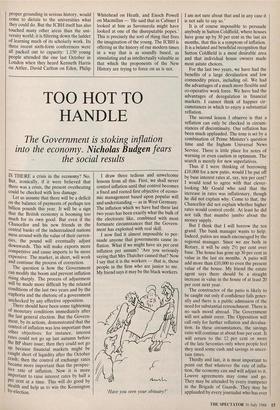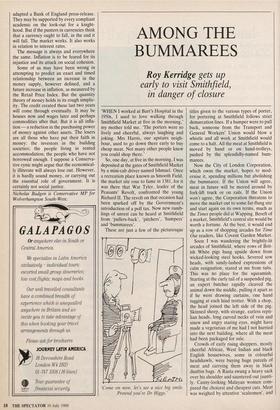TOO HOT TO HANDLE
The Government is stoking inflation the social results
IS THERE a crisis in the economy? No. But, ironically, if it were believed that there was a crisis, the present overheating could be checked with less damage.
Let us assume that there will be a deficit on the balance of payments of perhaps ten billion pounds this year. It will be a sign that the British economy is booming too much for its own good. But even if the Chancellor and his new friends in the central banks of the industrialised nations mess around with the value of their curren- cies, the pound will eventually adjust downwards. This will make exports more competitive and cause imports to be more expensive. The market, in short, will work and continue the process of correction. The question is how the Government can modify the boom and prevent inflation rising sharply. The process of adjustment will be made more difficult by the relaxed conditions of the last two years and by the euphoria and the rhetoric of a government unchecked by any effective opposition. There should have been some tightening of monetary conditions immediately after the last general election. But the Govern- ment, by its actions, demonstrated that the control of inflation was less important than other objectives: for instance, interest rates could not go up last autumn before the BP share issue; then they could not go uP because financial markets might be caught short of liquidity after the October crash; then the control of exchange rates became more important than the prospec- tive rate of inflation. Now it is more Important to raise interest rates by half a per cent at a time. This will do good by stealth and help us to win the Kensington by-election. I draw three tedious and unwelcome lessons from all this. First, we shall never control inflation until that control becomes a fixed and rooted first objective of econo- mic management based upon popular will and understanding — as in West Germany. The inflation which we have had these last two years has been exactly what the bulk of the electorate like, combined with most fortunate circumstances that the Govern- ment has exploited with real skill. I now find it almost impossible to per- suade anyone that governments cause in- flation. What if we might have six per cent inflation per annum? 'Are you seriously saying that Mrs Thatcher caused that? Now I say that it is the workers — that is, those people in the firm who are junior to me. My friend says it may be the black workers.
`Have you seen your obituary?' I am not sure about that and in any case it is not safe to say so.'
It is of course impossible to persuade anybody in Sutton Coldfield, where houses have gone up by 30 per cent in the last six months, that this is a symptom of inflation. It is a belated and beneficial recognition that Sutton Coldfield is a most desirable area and that individual house owners made most astute choices.
For the last two years, we have had the benefits of a large devaluation and low commodity prices, including oil. We had the advantages of a much more flexible and co-operative work force. We have had the advantages of deregulation in financial markets. I cannot think of happier cir- cumstances in which to enjoy a substantial reflation.
The second lesson I observe is that a reflation can only be checked in circum- stances of discontinuity. Our reflation has been much applauded. The tone is set by a combination of Prime Minister's question time and the Ingham Universal News Service. There is little place for notes of warning or even caution in optimism. The search is merely for new superlatives.
Thus if I were thinking of borrowing £10,000 for a new patio, would I be put off by base interest rates at, say, ten per cent?
I would tend to agree with that clever- looking Mr Gould who said that the increase in rates was inflationary, though he did not explain why. Come to that, the Chancellor did not explain whether higher rates would control credit. At least he did not talk that mumbo jumbo about the money supply.
But I think that I will borrow the ten grand. The bank manager wants to help.
Indeed, patios are much encouraged by the regional manager. Since we are both in Rotary, it will be only 21/2 per cent over base. The house has gone up 30 per cent in value in the last six months. A patio will add more than £10,000 to even the present value of the house. My friend the estate agent says there should be a straight increase in value in the house of at least 20 per cent next year.
The constructor of the patio is likely to be caught out only if confidence falls gener- ally and there is a public admission of the need for substantial retrenchment. There is no such mood abroad. The Government will not admit error. The Opposition will call only for further reflation and devalua- tion. In these circumstances, the savings ratio will continue at about four per cent. It will return to the 12 per cent or more of the late Seventies only when people feel they need some cash and savings in uncer- tain times.
Thirdly and last, it is most important to point out that whatever the rate of infla- tion, the economy can and will adjust to it.
Louvre agreements may come and go. They may be attended by every trumpeter in the Brigade of Guards. They may be applauded by every journalist who has ever adapted a Bank of England press-release. They may be supported by every compliant academic on the look-out for a knight- hood. But if the punters in currencies think that a currency ought to fall, in the end it will fall. The market works. It also works in relation to interest rates.
The message is always and everywhere the same. Inflation is to be feared for its injustice and its attack on social cohesion.
Some of us may have been wrong in attempting to predict an exact and timed relationship between an increase in the money supply, however defined, and a future increase in inflation, as measured by the Retail Price Index. But the quantity theory of money holds in its rough simplic- ity. The credit created these last two years will come through eventually. It may be houses now and wages later and perhaps commodities after that. But it is all infla- tion — a reduction in the purchasing power of money against other assets. The losers are all those who have put their faith in money: the investors in the building societies; the people living in rented accommodation; the people who have not borrowed enough. I suppose a Conserva- tive cynic might argue that the economical- ly illiterate will always lose out. However, it is hardly sound money, or carrying out the essential role of government. It is certainly not social justice.
Nicholas Budgen is Conservative MP for Wolverhampton South-West.



















































 Previous page
Previous page